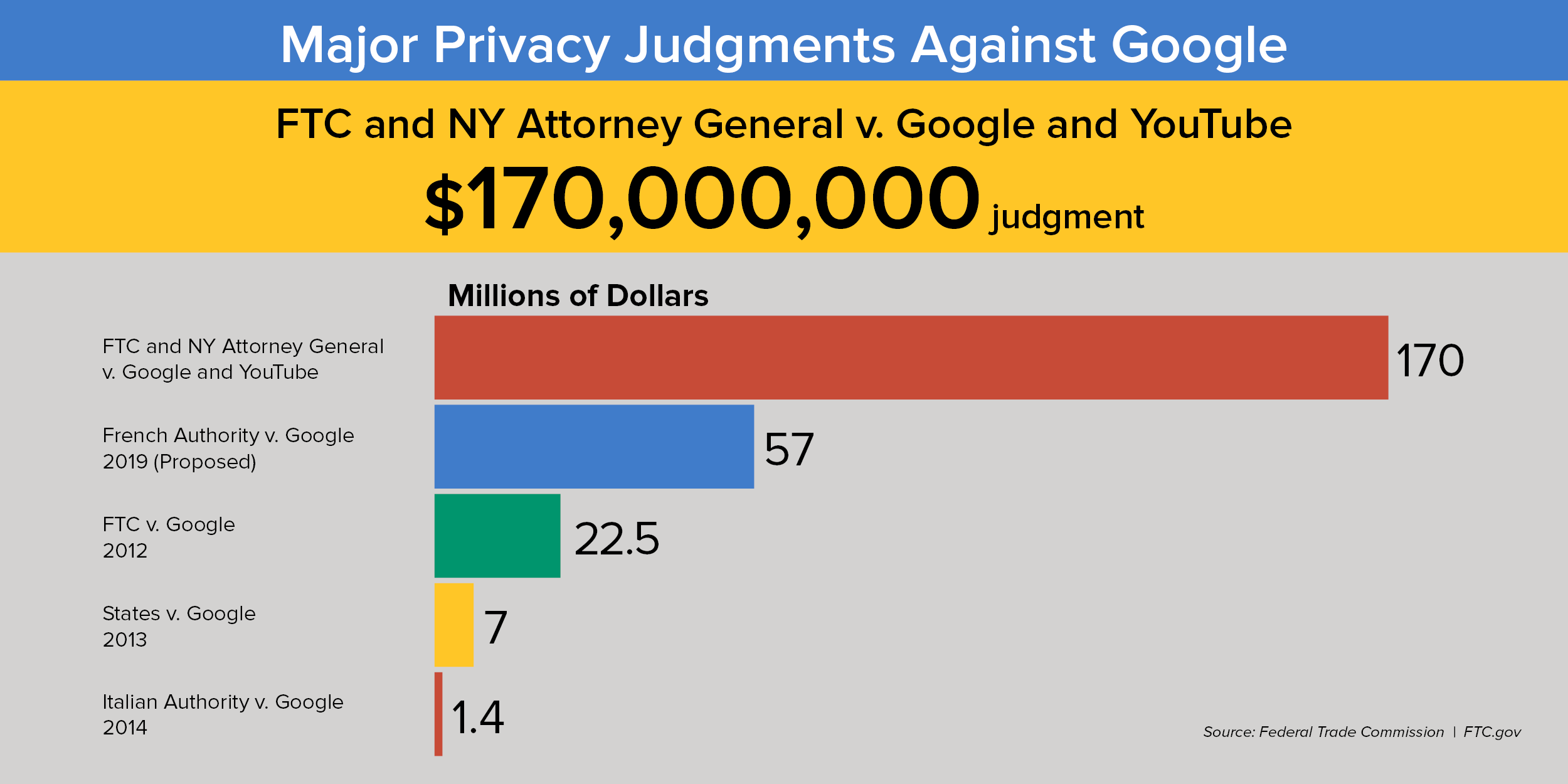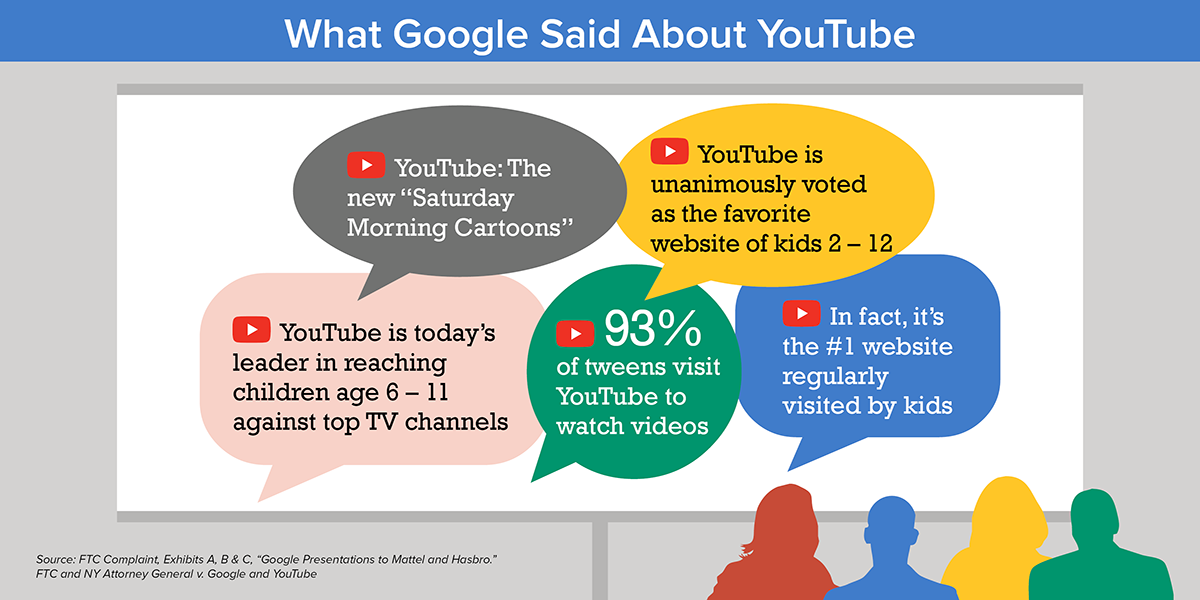Youtube Is Taking Too Long to Upload Complaints Today
NOTE: The FTC hosted an IN-PERSON press conference at FTC Headquarters on September 4. The news briefing was besides webcast; view archival video here.
Participants included FTC Chairman Joe Simons and Managing director of the FTC's Bureau of Consumer Protection Andrew Smith.
 Google LLC and its subsidiary YouTube, LLC will pay a record $170 million to settle allegations by the Federal Merchandise Commission and the New York Attorney Full general that the YouTube video sharing service illegally collected personal information from children without their parents' consent.
Google LLC and its subsidiary YouTube, LLC will pay a record $170 million to settle allegations by the Federal Merchandise Commission and the New York Attorney Full general that the YouTube video sharing service illegally collected personal information from children without their parents' consent.
The settlement requires Google and YouTube to pay $136 meg to the FTC and $34 million to New York for allegedly violating the Children's Online Privacy Protection Act (COPPA) Dominion. The $136 million penalty is by far the largest amount the FTC has ever obtained in a COPPA case since Congress enacted the law in 1998.
In a complaint filed against the companies, the FTC and New York Chaser General criminate that YouTube violated the COPPA Rule by collecting personal data—in the form of persistent identifiers that are used to track users across the Cyberspace—from viewers of child-directed channels, without offset notifying parents and getting their consent. YouTube earned millions of dollars by using the identifiers, commonly known every bit cookies, to evangelize targeted ads to viewers of these channels, co-ordinate to the complaint.
The COPPA Rule requires that child-directed websites and online services provide notice of their data practices and obtain parental consent prior to collecting personal information from children under 13, including the use of persistent identifiers to track a user's Internet browsing habits for targeted advertising. In addition, tertiary parties, such every bit advertizing networks, are also subject to COPPA where they have actual knowledge they are collecting personal information directly from users of child-directed websites and online services.
"YouTube touted its popularity with children to prospective corporate clients," said FTC Chairman Joe Simons. "All the same when it came to complying with COPPA, the company refused to admit that portions of its platform were conspicuously directed to kids. There'due south no excuse for YouTube'due south violations of the law."
The YouTube platform allows Google business relationship holders, including large commercial entities, to create "channels" to display their content. According to the complaint, eligible aqueduct owners tin cull to monetize their channel by allowing YouTube to serve behaviorally targeted advertisements, which generates revenue for both the channel owners and YouTube.
In the complaint, the FTC and New York Attorney General allege that while YouTube claimed to exist a general-audience site, some of YouTube's individual channels—such as those operated past toy companies—are child-directed and therefore must comply with COPPA.
 The complaint notes that the defendants knew that the YouTube platform had numerous child-directed channels. YouTube marketed itself as a acme destination for kids in presentations to the makers of popular children's products and brands. For example, Google and YouTube told Mattel, maker of Barbie and Monster Loftier toys, that "YouTube is today's leader in reaching children historic period 6-11 against acme TV channels" and told Hasbro, which makes My Lilliputian Pony and Play-Doh, that YouTube is the "#1 website regularly visited past kids."
The complaint notes that the defendants knew that the YouTube platform had numerous child-directed channels. YouTube marketed itself as a acme destination for kids in presentations to the makers of popular children's products and brands. For example, Google and YouTube told Mattel, maker of Barbie and Monster Loftier toys, that "YouTube is today's leader in reaching children historic period 6-11 against acme TV channels" and told Hasbro, which makes My Lilliputian Pony and Play-Doh, that YouTube is the "#1 website regularly visited past kids."
Several channel owners told YouTube and Google that their channels' content was directed to children, and in other instances YouTube's own content rating organisation identified content as directed to children. In addition, according to the complaint, YouTube manually reviewed children'south content from its YouTube platform to feature in its YouTube Kids app. Despite this noesis of channels directed to children on the YouTube platform, YouTube served targeted advertisements on these channels. According to the complaint, it even told one advertising company that it did non have users younger than 13 on its platform and therefore channels on its platform did not demand to comply with COPPA.
Settlement with the FTC
In add-on to the budgetary penalization, the proposed settlement requires Google and YouTube to develop, implement, and maintain a arrangement that permits channel owners to identify their child-directed content on the YouTube platform so that YouTube can ensure it is complying with COPPA. In addition, the companies must notify channel owners that their kid-directed content may exist subject to the COPPA Rule'southward obligations and provide almanac preparation about complying with COPPA for employees who bargain with YouTube channel owners.
The settlement likewise prohibits Google and YouTube from violating the COPPA Dominion, and requires them to provide notice nigh their data collection practices and obtain verifiable parental consent before collecting personal information from children.
The Committee voted 3-two to qualify the complaint and stipulated final orderto exist filed. Chairman Simons and Commissioner Christine S. Wilson issued a argument on this matter, while Commissioners Noah Joshua Phillips, Rohit Chopra, and Rebecca Kelly Slaughter issued separate statements.
The complaint and proposed consent decree were filed in the U.S. District Court for the Commune of Columbia. NOTE: The Commission authorizes the filing of a complaint when it has "reason to believe" that the law has been or is being violated, and information technology appears to the Commission that a proceeding is in the public interest. Consent decrees take the force of police force when approved and signed by the district court estimate.
The FTC would like to thank the coalition of consumer groups represented past Georgetown University's Establish for Public Representation that filed a petition providing valuable information on this matter.
The Federal Trade Commission works to promote competition, and protect and educate consumers. Y'all tin can acquire more about consumer topics and file a consumer complaint online or by calling 1-877-FTC-HELP (382-4357). Like the FTC on Facebook, follow us on Twitter, read our blogs, and subscribe to press releases for the latest FTC news and resources.
madirazzaereun1996.blogspot.com
Source: https://www.ftc.gov/news-events/news/press-releases/2019/09/google-youtube-will-pay-record-170-million-alleged-violations-childrens-privacy-law